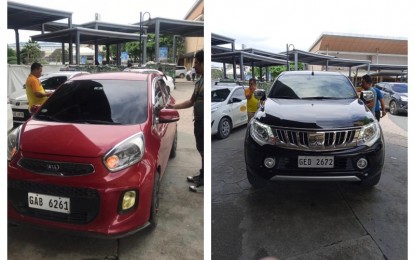
ILLEGAL RIDE-HAILING APP. Personnel of the Land Transportation Franchising and Regulatory Board (LTFRB) and Highway Patrol Group (HPG) in Region 7 apprehend the drivers of a Kia Picanto sedan and a Mitsubishi Strada pick-up truck for operating as transport network vehicle service using Maxim, a ride-hailing application which is not accredited with the agency. LTFRB-7 Regional Director Eduardo Montealto Jr. on Monday (Feb. 10, 2020) said that Maxim is the second ride-hailing app to operate in Cebu without seeking government permit, with inDriver as the first to be monitored in January this year. (Photo courtesy of LTFRB-7)
CEBU CITY -- The Land Transportation Franchising and Regulatory Board (LTFRB-7) in Central Visayas on Monday said it is monitoring another Russia-based ride-hailing application that is operating in Cebu even without securing government permit.
Retired Col. Eduardo Montealto Jr., regional director of LTFRB-7, said that Maxim, a ride-sharing app that originated from Shadrinsk, Russia is actively operating in Cebu despite absence of accreditation from their office.
“On Feb. 7, a joint operation with LTFRB-7 and Highway Patrol Group-7 apprehended a transport network vehicle service (TNVS) using the so-called Maxim ride-hailing app. The units that we apprehended are a Kia Picanto and a Mitsubishi Strada pickup type truck,” Montealto said.
Maxim has not sought accreditation with the LTFRB to operate legally as a ride-hailing app for booking of trips by customers via mobile phones or tablets, he said.
Montealto admitted there are so many unaccredited TNVS operating in Cebu and using apps that are not registered with the agency.
Last month, LTFRB-7 operatives apprehended six cars for illegally operating as TNVS using inDriver, another unaccredited ride-hailing app.
Both inDriver and Maxim are not among the list of LTFRB-recognized apps such as Grab Car, MiCab, Hype and Hirna.
InDriver was founded in 2012 but Maxim started as a modern taxi-ride ordering service in Russia in 2003 and simultaneously opened branches in seven cities worldwide in 2009. It expanded to 17 more cities in 2010.
Montealto lamented that Filipino counterparts of Maxim and inDriver operators abroad could clandestinely operate in Cebu without fear being detected by authorities.
According to initial investigation by the LTFRB-7, Maxim has revealed in its Facebook account the address of its office along J. De Veyra Street in North Reclamation Area here.
Montealto, however, said operations personnel will continue to monitor their movements and conduct apprehensions against TNVS operators using Maxim and inDriver based on intelligence reports that they can gather.
TNVS operating via unaccredited ride-hailing app are not paying taxes to the Bureau of Internal Revenue, he said.
He said the two vehicles apprehended on Friday in a mall in Mandaue City were placed in the impounding area pending payment of penalty ranging from PHP120,000 to PHP200,000 for engaging in colorum operations, aside from being blacklisted for 90 days.
LTFRB record showed Cebu has reached the cap of 1,500 TNVS while the request for additional units has not yet been approved by the board. (PNA)
